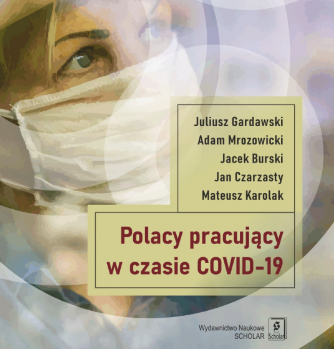First book, first look (back)
At the end of 2022, the first major book publication summarising the results of the project was published by Scholar: “Poles working during Covid-19” by Juliusz Gardawski, Adam Mrozowicki, Jacek Burski, Jan Czarzasty and Mateusz Karolak (2022). We invite you to read a short blog summary of the conclusions of the monograph.

In the book we have approached the Covid-19 pandemic as a global social crisis impacting societies and nations, socio-occupational groups, socio-demographic strata as well as social classes in various ways. We have stepped forward with two hypotheses. The first hypothesis assumes the transformative potential of the health crisis for the socio-economic consciousness, work situation and life strategies of Poles, which may translate – in the last instance – into a crisis of the entire socio-economic system based on neoliberal principles. The second hypothesis indicates that, although we have been facing an unprecedented social crisis, the socio-economic system and the key features of socio-economic consciousness (“the normative visions of economy”) show considerable resilience. The pandemic has accelerated change and is likely to intensify phenomena already present for a long time in the pre-pandemic world, but its transformative potential has been – at least in short-term, according to our research – limited. Eventually, we have come to realize that the second hypothesis has endured the empirical test more convincingly than the hypothesis one. In other words, the change induced by the pandemic is not a radical shift but rather a booster to the processes already underway. So the world of work has experienced a reconfiguration rather than a revolution.
The empirical research presented in the book employed a combination of quantitative (analysis of data from a representative survey of a nationwide sample of adults) and qualitative (analysis of focus group interviews with those working in four sectors: education, health-care, social assistance and logistics, as well as analysis of the media discourse around the topic of ‘essential work’) methods and techniques. The category of essential workers played special role in the qualitative research. For the purposes of the research, we define essential workers as people whose work is necessary for social reproduction and providing for biological and basic social needs under pandemic conditions. Opinions on the quality of work during Covid-19 varied much more and were generally more critical among essential workers than the CATI survey suggested. Symbolic expressions of gratitude they encountered in the media at the early stage of the pandemic turned out to be short-lived and did not translate into any systemic, lasting improvements in their working conditions. Based on the qualitative analyses, it can be assumed that the critical assessment of the quality of work in health-care, education, social assistance and logistics, coupled with chronic labour shortages, is likely to result in a growing potential for discontent in those groups as polycrises unfold.
Gardawski, J., Mrozowicki, A., Burski, J., Czarzasty, J., & Karolak, M. (2022). Polacy pracujący w czasach COVID-19. Wydawnictwo Scholar.
